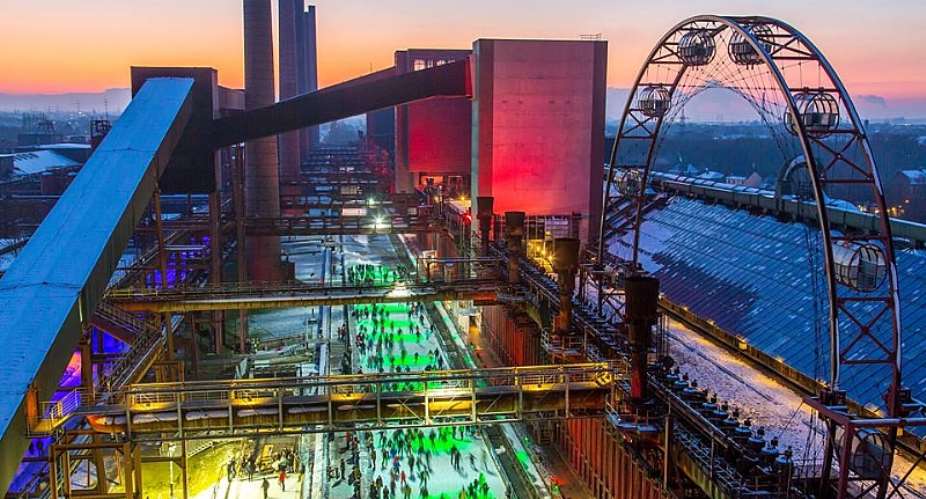The German city of Essen is Europe's "Green Capital" in 2017, a title awarded by the European Commission, for its success in transitioning from a heavily polluting mining center to a clean and green economy.
The award helps to highlight the crucial importance of city climate action in the run-up to the UN Climate Change Conference in Bonn in November (COP23), hosted by the the UN and presided over by Fiji, with the support of the German government.
Both Essen and Bonn are located in North Rhine-Westphalia, Germany’s most populous state. Commenting on the award, the Lord Mayor of Essen Thomas Kufen, said:
"This is powerful recognition that Essen and North Rhine-Westphalia are a hub for environmental and climate protection. We hope that both the UN Climate Change Conference and our role as Europe's Green Capital can send positive impulses for change across Europe and the world."
The greening of cities is essential to achieve the key goal of the Paris Climate Change Agreement, which is to limit the global average temperature rise to as close as possible to 1.5 degrees Celsius. The role of cities is particularly important to limit the global average temperature rise. Around 75 per cent world’s primary energy is consumed in urban areas, and cities emit between 50 and 60 per cent of the planet’s greenhouse gas emissions.
Successful Transition from Mining Industry to a Services-Based Economy
Essen used to be one of Germany's most important coal centers, and is the first mining city to win the title of European Green Capital.
In order to protect nature and biodiversity, Essen has built "green corridors" and is renaturalizing the river Emscher. In the area known as the Krupp Belt, former site of the Krupp cast steel factory, a leisure area has been built, full of trees and criss-crossed with bicycle paths.

Essen meanwhile has many green spaces
Essen began large-scale coal production in the early 19th century. The decline of the coal and steel industries in the region led to the closing of the last colliery in 1986. The city then successfully restructured into a services and financial center.
The city of Essen intends to reduce CO2 emissions by 40% by 2020 over 1990 levels. Emissions already dropped by 29,5 per cent in 2011 in relation to 1990, exceeding the German national average reduction.
This happened through a combination of national, state and local measures, prompting a reduction in the use of fuels such as heating oil, lignite and black coal and by ramping up district heating and renewable energy deployment.
Since 2010, the city has been buying certified green electricity, and since 2012 it has been helping all relevant stakeholders go green via a dedicated municipal agency. The Essen Climate Agency offers advisory services and works as a hub for consumers, companies, associations and other entities. It is also responsible organizing environmental projects and campaigns.
The European Green Capital award will be celebrated in Essen with over 300 activities throughout this year, including many activities involving local citizens.
Photo Credit: Jochen Tack / Stiftung Zollverein and Johannes Kassenberg





 2024 election: Don’t be scared; we're ready to maintain law and order – Dampare ...
2024 election: Don’t be scared; we're ready to maintain law and order – Dampare ...
 NDC to officially outdoor Prof Jane Naana as 2024 running mate on April 24
NDC to officially outdoor Prof Jane Naana as 2024 running mate on April 24
 Power outages: Always give 3 days prior notice — PURC to ECG
Power outages: Always give 3 days prior notice — PURC to ECG
 NDC's quest to wrestle power from NPP goes beyond partisanship; it’s a national ...
NDC's quest to wrestle power from NPP goes beyond partisanship; it’s a national ...
 ECG board members slapped GHS5.8 million fine by PURC for failing to alert publi...
ECG board members slapped GHS5.8 million fine by PURC for failing to alert publi...
 I never left NPP, they 'sacked' me for attending Alan's programme; even a $100mi...
I never left NPP, they 'sacked' me for attending Alan's programme; even a $100mi...
 Fuel prices go up today
Fuel prices go up today
 Anti-gay bill: Your stance serves no purpose; either you actively advocate for t...
Anti-gay bill: Your stance serves no purpose; either you actively advocate for t...
 Tension brews as NPP Seattle clashes with national leadership over parallel chap...
Tension brews as NPP Seattle clashes with national leadership over parallel chap...
 Anti-gay bill: You've done nothing in Ghana to prove you're against LGBTQ+; ther...
Anti-gay bill: You've done nothing in Ghana to prove you're against LGBTQ+; ther...
